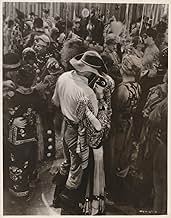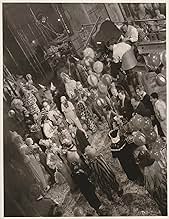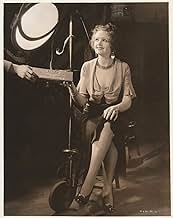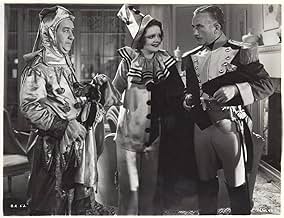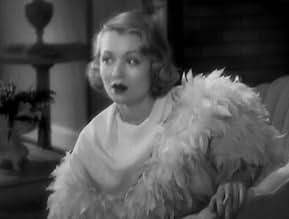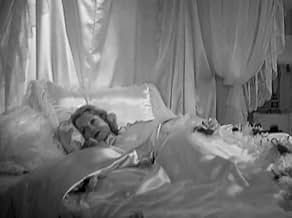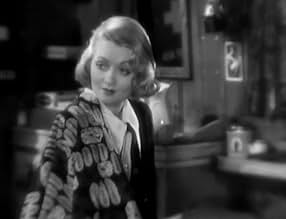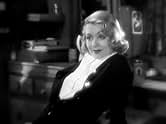ÉVALUATION IMDb
6,4/10
1,2 k
MA NOTE
Ajouter une intrigue dans votre langueDetermined to reform upon leaving prison, a former prostitute falls in love with a cotton-barge owner and must choose between him and her banker lover.Determined to reform upon leaving prison, a former prostitute falls in love with a cotton-barge owner and must choose between him and her banker lover.Determined to reform upon leaving prison, a former prostitute falls in love with a cotton-barge owner and must choose between him and her banker lover.
- Director
- Writers
- Stars
Samuel S. Hinds
- Father Doran
- (as Samuel Hinds)
Tom Herbert
- Salesman Ogelthorpe
- (as Tom Francis)
Wade Boteler
- River Boat Purser
- (uncredited)
Eddy Chandler
- River Boat Steward
- (uncredited)
Jane Darwell
- Mrs. Webster - Head Prison Matron
- (uncredited)
Arthur Hoyt
- Hoyt - Paige's Secretary
- (uncredited)
John Larkin
- Man Meeting Released Prisoner
- (uncredited)
Matt McHugh
- Mr. Jones
- (uncredited)
Eileen Percy
- Woman
- (unconfirmed)
- (uncredited)
George Reed
- Alice - Dan's Shipboard Cook
- (uncredited)
Mildred Washington
- Genevieve - Lorry's Maid
- (uncredited)
Avis en vedette
Constance Bennett and pal Pat Kelton get out of prison and will do anything--ANYTHING--to get a man with cash. Bennett eventually falls in love with poor Joel McCrea--but will she be able to tell him about her past?
Nothing new story wise but some of the dialogue and situations are pretty frank for 1933. It's made quite clear that Bennett and Kelton have, and will, sleep with men for money. Also one woman is very obviously a kept woman. Very much a pre-Code film.
The dialogue is sharp, funny, fast and racy. All the acting is great--Bennett is just beautiful, McCrea is young, hunky and handsome and Kelton is hysterical doing a Mae West imitation.
Quick (67 minutes) and worth catching.
Nothing new story wise but some of the dialogue and situations are pretty frank for 1933. It's made quite clear that Bennett and Kelton have, and will, sleep with men for money. Also one woman is very obviously a kept woman. Very much a pre-Code film.
The dialogue is sharp, funny, fast and racy. All the acting is great--Bennett is just beautiful, McCrea is young, hunky and handsome and Kelton is hysterical doing a Mae West imitation.
Quick (67 minutes) and worth catching.
This one's really a very good picture and upon watching it...I didn't feel like watching an old piece of a museum...no, no, on the very contrary, it's a lively, very well paced, cast & acted film, I'd even say it didn't seem dated to me. Surely Gregory LaCava (later responsible for Carole Lombard's 1936 "My Man Godfrey") did an excellent job with this picture.
I'd never seen before Pert Kelton, in her young days...and she's hot!, I found myself laughing loudly, after listening to her endless wisecracks, playing the heroine's (Constance Bennett) pal, world weary, self-assured, etc... her way of speaking reminded me of Mae West. Both Girls (Bennett & Kelton) impersonate a pair of streetwalkers or "easy women" who want to make it big & go places, after being released of prison.
Johnny Halliday is very good too, as the millionaire Bennett tries to "catch"... and Joel McCrea, is the usual good guy, ... but no so naive, honest man, for whom Connie Bennett falls . He plays very well opposite Bennett, 'cos they have lots of chemistry...well, that may be the reason why they were paired more times by RKO.
Look for Jane Darwell (uncredited) as the head of the women's prison from where Kelton & Bennett are released at the beginning of the movie and for Frankling Pangborn as a clerk... I'm even sure that I saw Louise Beavers (star of "Imitation of Life" (1934)), as one of the women that were released along with Bennett and Kelton.
You've got to watch this one, not only if you're fond of Pre-Code early talkies, but for plain fun.
I'd never seen before Pert Kelton, in her young days...and she's hot!, I found myself laughing loudly, after listening to her endless wisecracks, playing the heroine's (Constance Bennett) pal, world weary, self-assured, etc... her way of speaking reminded me of Mae West. Both Girls (Bennett & Kelton) impersonate a pair of streetwalkers or "easy women" who want to make it big & go places, after being released of prison.
Johnny Halliday is very good too, as the millionaire Bennett tries to "catch"... and Joel McCrea, is the usual good guy, ... but no so naive, honest man, for whom Connie Bennett falls . He plays very well opposite Bennett, 'cos they have lots of chemistry...well, that may be the reason why they were paired more times by RKO.
Look for Jane Darwell (uncredited) as the head of the women's prison from where Kelton & Bennett are released at the beginning of the movie and for Frankling Pangborn as a clerk... I'm even sure that I saw Louise Beavers (star of "Imitation of Life" (1934)), as one of the women that were released along with Bennett and Kelton.
You've got to watch this one, not only if you're fond of Pre-Code early talkies, but for plain fun.
A witty vehicle for the beautiful Constance Bennett, this has dialogue that seems to aspire to that of Noel Coward.
Bennett and the delightful Pert Kelton leave prison at the same time. (Later, Bennett refers to Kelton as her roommate from convent. One wonders if Patrick Dennis was inspired by this when he had Belle Poitrine describe her reform school friend Winnie as a friend from boarding school. This occurs in "Little Me," one of the most hilarious books ever written and surely, 40 years or more after its publication, a dead-on commentary on movie star autobiographies.) Bernnett finds herself a nice sugar daddy in John Halliday. He sets her up in some swank apartment, let me tell you! Alas, she meets Joel McCrea, here the owner of a fishing boat. He looks bony here -- but as gorgeous a man as ever graced the screen. His only equal was Gary Cooper around this time.
Bennett falls for him and is willing to dump her riches to take to the sea with him -- as who in his or her right mind would not have. These plans are thwarted by jealous Halliday. But after a Mardi Gras sequence that doesn't entirely work, all ends happily -- at least for our two beautiful stars.
Bennett and the delightful Pert Kelton leave prison at the same time. (Later, Bennett refers to Kelton as her roommate from convent. One wonders if Patrick Dennis was inspired by this when he had Belle Poitrine describe her reform school friend Winnie as a friend from boarding school. This occurs in "Little Me," one of the most hilarious books ever written and surely, 40 years or more after its publication, a dead-on commentary on movie star autobiographies.) Bernnett finds herself a nice sugar daddy in John Halliday. He sets her up in some swank apartment, let me tell you! Alas, she meets Joel McCrea, here the owner of a fishing boat. He looks bony here -- but as gorgeous a man as ever graced the screen. His only equal was Gary Cooper around this time.
Bennett falls for him and is willing to dump her riches to take to the sea with him -- as who in his or her right mind would not have. These plans are thwarted by jealous Halliday. But after a Mardi Gras sequence that doesn't entirely work, all ends happily -- at least for our two beautiful stars.
Gregory LaCava, shows he is a very inspired director with "Bed of Roses" a film that dealt frankly with things that were to be forgotten when the Hays Code was finally enforced in 1934. This was a different Hollywood, one that took chances in presenting things the way they were, and without being hypocritical about them.
This was obvious a vehicle for Constance Bennett, the beautiful actress. She plays Lorry Evans, who has just been released from jail. Together with her partner, Minnie Brown, they hit New Orleans in search for a meal ticket, preferably a rich man to keep them in style.
Lorry finds such a man in Steve Paige, who is more than generous, but he demands something that the beautiful Lorrie doesn't feel for him, love! She meets hunky Dan Walters, and it's love at first sight, or so it seems. The only problem is that Dan is a poor man who can't give Lorrie what she has been used to.
As far as the melodrama goes, it's pretty conventional. What made an impression on this viewer was the frankness in which the subject matter is presented. Constance Bennett and Joel McCrea are perfect together. Both of them were attractive and young, in contrast with "sugar daddy" John Halliday, who keeps reminding Lorrie about her new acquired tastes. Pert Kelton, is seen as Minnie in a fantastic performance.
This was a film produced in Hollywood before the Code and it shows.
This was obvious a vehicle for Constance Bennett, the beautiful actress. She plays Lorry Evans, who has just been released from jail. Together with her partner, Minnie Brown, they hit New Orleans in search for a meal ticket, preferably a rich man to keep them in style.
Lorry finds such a man in Steve Paige, who is more than generous, but he demands something that the beautiful Lorrie doesn't feel for him, love! She meets hunky Dan Walters, and it's love at first sight, or so it seems. The only problem is that Dan is a poor man who can't give Lorrie what she has been used to.
As far as the melodrama goes, it's pretty conventional. What made an impression on this viewer was the frankness in which the subject matter is presented. Constance Bennett and Joel McCrea are perfect together. Both of them were attractive and young, in contrast with "sugar daddy" John Halliday, who keeps reminding Lorrie about her new acquired tastes. Pert Kelton, is seen as Minnie in a fantastic performance.
This was a film produced in Hollywood before the Code and it shows.
This is a superbly engrossing melodrama with a hard-hitting edge presented in an accessible, non-confrontational style.
Like a lot of early thirties pictures, the theme this deals with is the pitiful and frighteningly awful lack of opportunities young, poor women had back then. It's not as shocking as Loretta Young's SHE HAD TO SAY YES (actually an even better film) which left you with the jaw-dropping realisation of what times were really like but nevertheless it still destroys any false preconceptions that gold diggers or prostitutes did that out of choice.
In a challenging role, Constance makes her character difficult to like at the start. Her task is to try to get the get the audience on her side which she achieves effortlessly. She mainly played heiresses or glamorous romantic heroines so this was a bit of a departure for her but any worries that she'd not be able to convey a low-life, hard boiled amoral girl from the wrong side of the tracks were instantly dispelled. (She does a million times better at this than her sister did in the terrible ME AND MY GAL) I wonder if this character was a man would the audience be so easily swayed - but of course what made this person so unpleasant was specifically because she wasn't a man: she had had to survive in that brutal society in the only way she knew how.
Director Gregory la Cava never lets your attention slip for a minute, makes it lovely to look at and plays a lot with symbolism. It's interesting to compare how different Constance Bennett's character behaves depending on what sort of room she is in particularly in the prison cell or the ill-gotten opulent suite, her self-made prison cell.
Overall it's a fabulous insight into how life had to be lived in the early thirties. It's directed with energy and fun so although it's all serious stuff, it still feels funny. Constance Bennett is surprisingly brilliant, she gained her fame from her looks but this proves that she's wasn't just a pretty face. She carries this whole film herself so how good the rest of the cast are doesn't really matter - although you do get a little irritated by Pert Kelton's annoying Mae West impersonation.
Like a lot of early thirties pictures, the theme this deals with is the pitiful and frighteningly awful lack of opportunities young, poor women had back then. It's not as shocking as Loretta Young's SHE HAD TO SAY YES (actually an even better film) which left you with the jaw-dropping realisation of what times were really like but nevertheless it still destroys any false preconceptions that gold diggers or prostitutes did that out of choice.
In a challenging role, Constance makes her character difficult to like at the start. Her task is to try to get the get the audience on her side which she achieves effortlessly. She mainly played heiresses or glamorous romantic heroines so this was a bit of a departure for her but any worries that she'd not be able to convey a low-life, hard boiled amoral girl from the wrong side of the tracks were instantly dispelled. (She does a million times better at this than her sister did in the terrible ME AND MY GAL) I wonder if this character was a man would the audience be so easily swayed - but of course what made this person so unpleasant was specifically because she wasn't a man: she had had to survive in that brutal society in the only way she knew how.
Director Gregory la Cava never lets your attention slip for a minute, makes it lovely to look at and plays a lot with symbolism. It's interesting to compare how different Constance Bennett's character behaves depending on what sort of room she is in particularly in the prison cell or the ill-gotten opulent suite, her self-made prison cell.
Overall it's a fabulous insight into how life had to be lived in the early thirties. It's directed with energy and fun so although it's all serious stuff, it still feels funny. Constance Bennett is surprisingly brilliant, she gained her fame from her looks but this proves that she's wasn't just a pretty face. She carries this whole film herself so how good the rest of the cast are doesn't really matter - although you do get a little irritated by Pert Kelton's annoying Mae West impersonation.
Le saviez-vous
- AnecdotesThe last of four films co-starring Constance Bennett and Joel McCrea, along with Born to Love (1931), The Common Law (1931), and Rockabye (1932).
- GaffesWhen Lorry is in her room on the steamboat, there is a fur coat on the top bunker resting up against the bedpost. On the following cuts, the orientation of the coat keeps changing. The matching hat on the top bunker also changes orientation.
- Citations
Mrs. Webster - Head Prison Matron: As Head Matron of his Institution, in all my experience, I have never come...
Lorry Evans: Save your wind, save your wind, you might want to go sailing sometime.
- Bandes originalesYou're the Flower of My Heart, Sweet Adeline
(1903) (uncredited)
Music by Harry Armstrong
Lyric by Richard H. Gerard
Sung a cappella and offscreen by Matt McHugh and Pert Kelton
Meilleurs choix
Connectez-vous pour évaluer et surveiller les recommandations personnalisées
Détails
- Date de sortie
- Pays d’origine
- Langue
- Aussi connu sous le nom de
- Lecho de rosas
- Lieux de tournage
- société de production
- Consultez plus de crédits d'entreprise sur IMDbPro
- Durée1 heure 7 minutes
- Couleur
- Rapport de forme
- 1.37 : 1
Contribuer à cette page
Suggérer une modification ou ajouter du contenu manquant

Lacune principale
By what name was Bed of Roses (1933) officially released in India in English?
Répondre
